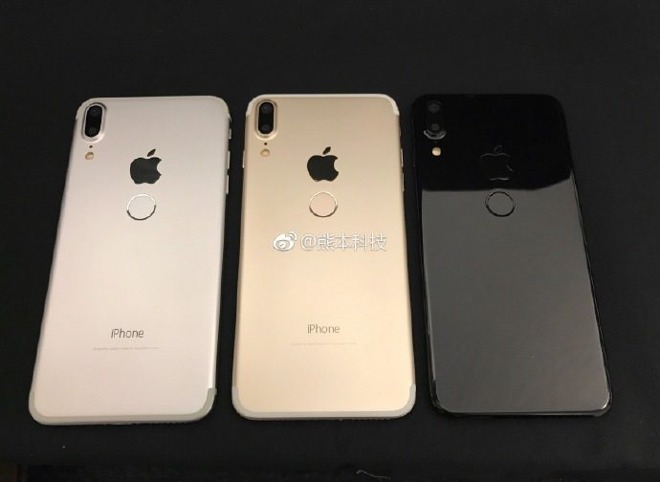Apple has decided against an embedded Touch ID solution for its forthcoming "iPhone 8" handset, according to well-connected analyst Ming-Chi Kuo, leaving the door open for competitor Samsung to debut similar technology in next year's Galaxy Note 9.
In a note to investors obtained by AppleInsider, Kuo says Apple has "cancelled" plans to embed a fingerprint recognition solution in the next-generation flagship iPhone. The analyst left embedded Touch ID off a list of standout "iPhone 8" features published in July, but did not indicate that Apple had abandoned the initiative altogether.
It is not clear when Apple made the decision, but embedded Touch ID was one of the more hotly anticipated features for inclusion in this year's OLED iPhone release, with Kuo himself first hinting at its debut in January. Specifically, the analyst said Apple would swap out capacitive sensing technology in favor of an optical solution capable of accepting readings through OLED panel stacks. These under panel systems remove the need for a dedicated physical home button, allowing for full-face displays.
The prediction contradicts a slew of reports claiming Apple was on track to make under-glass fingerprint sensors a reality. In June, for example, Cowen and Company's Timothy Arcuri said Apple had landed at three potential options: thinning the cover glass over the fingerprint sensor area, creating a pinhole through the glass for a smaller sensor or integrating a thin film sensor into the display.
Recently released HomePod firmware seems to back up Kuo's assertions, however. Lines of code relating to the handset's "FaceDetect" software, referred to as "Pearl ID" in the firmware, show tie-ins with Apple Pay authentication. In particular, references to "pearl.field-detect" and "pearl.pre-arm" appear in a section of the firmware dedicated to Passbook payments and Apple Pay, suggesting methods of recognizing a user's face to facilitate fast access to Apple Pay's user interface.
Further, developer Steven Troughton Smith, who sifted through the HomePod code this week, has yet to find graphical assets that would suggest the inclusion of an under-screen Touch ID solution.
With embedded fingerprint readers not in play, exactly what ilk of biometric security Apple plans to use in "iPhone 8" remains unclear. Previously, Kuo suggested a two-step fingerprint and facial recognition system would replace Touch ID as we know it. Indeed, multiple sources have affirmed that the next-generation handset will sport a front-facing camera capable of executing complex depth-sensing operations, but whether the system is accurate or secure enough for protecting user information is unknown.
In today's note, Kuo notes Apple's decision gives segment competitor Samsung some breathing room for 2018. Without embedded Touch ID in "iPhone 8," the Korean company is unlikely to feel pressured into mimicking such technology in a next-generation "Galaxy S9" smartphone. This will allow Samsung to concentrate on further developing iris recognition and dual-camera functions.
Kuo predicts Samsung to ultimately incorporate under-screen optical fingerprint hardware with the "Galaxy Note 9," a phablet device expected to debut a few months after the Galaxy S9 and before the 2018 iPhone. The Korean tech giant will potentially tap Egis for both S9 and Note 9 fingerprint components, replacing current supplier Synaptics, Kuo says.
 Mikey Campbell
Mikey Campbell







-m.jpg)






 Christine McKee
Christine McKee
 Marko Zivkovic
Marko Zivkovic
 Mike Wuerthele
Mike Wuerthele

 Amber Neely
Amber Neely
 Sponsored Content
Sponsored Content
 Wesley Hilliard
Wesley Hilliard










90 Comments
Complete BS that Apple took this decision now... Come on.
Kuo is making me mad with his total P.O.S. "notes"; he's shameless..
All those so called analysts right now are playing in garbage time...
Also, about Kuo, he should STFU, he's running at 20% accuracy right now just this year considering the long list of so called predictions.
Good for Apple.
Apple doesn't like shipping products that s*ck as often as Samsung does.
The user experience has to be great or Apple won't ship it just for the sake of shipping it.
Otherwise there is hell to pay for the Vice President in charge of that feature [as Scott Forstall learned years ago].
Samsung on the other hand washes their hands off of you after the sale.
Steve Jobs would of gotten it done!
There is one big reason to forgo having an under glass fingerprint sensor: It would make the iPhone much harder for a blind person to use.
This made it unacceptable.
Kuo has no idea what Apple will do.